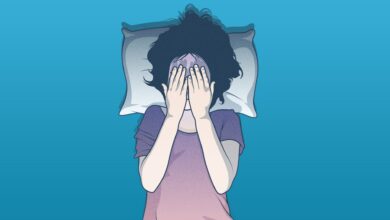Managing the Symptoms of Insomnia: Tips for Better Sleep


A common symptom of insomnia is trouble falling or staying asleep, a condition that affects millions of individuals globally. Lack of sleep can have far-reaching effects on one’s capacity to think clearly, maintain emotional stability, and maintain physical health. Medication isn’t always necessary to treat insomnia, though; a variety of techniques and way of life adjustments can greatly enhance the quality of your sleep. We’ll look at a variety of strategies and tactics in this post to assist you better sleep and efficiently manage insomnia.
Understanding Insomnia
Prior to exploring potential remedies, it’s critical to comprehend the symptoms of insomnia. More than a few sleepless nights, insomnia is the inability to fall asleep, stay asleep, or experience restorative sleep when you have the chance to sleep. If left untreated, chronic insomnia can result in daytime tiredness, irritation, difficulties concentrating, and even more serious health problems.
Lifestyle Changes for Better Sleep
- Create a Regular Sleep Schedule: Your body’s internal clock is regulated when you go to bed and wake up at the same times each day, which facilitates natural sleep and wakefulness.
- Establish a Calm Bedtime Schedule: Before going to bed, partake in peaceful pursuits like reading, having a warm bath, or doing deep breathing or meditation. At least one hour before going to bed, stay away from bright screens and stimulating activities.
- Enhance Your Sleep Environment: Make sure your bedroom is quiet, dark, and cold so that you can sleep well. Invest on pillows that promote proper posture and a comfy mattress.
- Limit naps during the day: Short naps throughout the day might be refreshing, but prolonged or erratic naps during the day can throw off your sleep routine at night. If you must nap, try to get in between 20 and 30 minutes in the early afternoon.
- Watch Your Food and Exercise: Steer clear of heavy meals, coffee, and alcohol right before bed. Frequent daytime physical activity can help you sleep better at night, but stay away from strenuous exercise right before bed.
Cognitive Behavioral Techniques (CBT) for Insomnia
Cognitive-behavioral therapy for insomnia (CBT-I) is a systematic approach designed to assist recognize and replace beliefs and actions that either exacerbate or cause sleep issues. Several essential elements consist of:
Controlling stimuli: Limiting activities in bed to sleeping and having sex. This helps associate the bed with sleeping.Limiting the amount of time spent awake in bed in order to gradually extend your sleep duration is known as sleep restriction.
Relaxation techniques: Before going to bed, use techniques like progressive muscle relaxation or guided imagery to ease your body and mind. Before using medicine, CBT-I is advised as a first-line treatment for chronic insomnia because of its demonstrated high efficacy in treating the condition.
Herbal and Supplemental Aids
Certain herbal therapies and supplements: may have some little advantages for enhancing the quality of your sleep, but they shouldn’t be used in place of treating the underlying reasons of insomnia. Among them are:
- Melatonin: Melatonin is a hormone that controls sleep-wake cycles; supplementation of this hormone might be useful for modifying sleep patterns, especially for shift work or jet lag.
- Root of Valerian: Valerian root, which is frequently used as a sedative and sleep aid, may help shorten the time it takes to fall asleep and enhance the quality of sleep.
- L-aspartic acid L-theanine: which is present in green tea, encourages relaxation and, when taken as a supplement, can enhance the quality of sleep.
Before beginning any new supplement regimen, it’s crucial to speak with a healthcare professional because some supplements may have negative effects or interfere with prescription drugs.
Managing Stress and Anxiety
Stress and anxiety are common contributors to insomnia. Learning effective stress management techniques can significantly improve sleep quality:
- Mindfulness Meditation: Practicing mindfulness can reduce racing thoughts and promote relaxation.
- Journaling: Writing down worries or thoughts before bed can help clear your mind.
- Therapy: Cognitive-behavioral therapy (CBT) and other forms of therapy can help address underlying anxiety or stress that disrupts sleep.
When to Seek Professional Help
If despite trying these strategies your insomnia persists or worsens, it may be time to seek help from a healthcare professional. They can help identify any underlying medical or psychological causes of insomnia and recommend appropriate treatment options, which may include medications or further therapy.
Conclusion
Managing insomnia requires a multifaceted approach that includes lifestyle changes, behavioral strategies, and sometimes therapeutic interventions. By adopting healthy sleep habits, addressing stress and anxiety, and seeking appropriate professional help when needed, you can significantly improve your sleep quality and overall well-being. Remember, everyone’s sleep needs are different, so it may take some experimentation to find what works best for you. With persistence and patience, better sleep is within reach.









